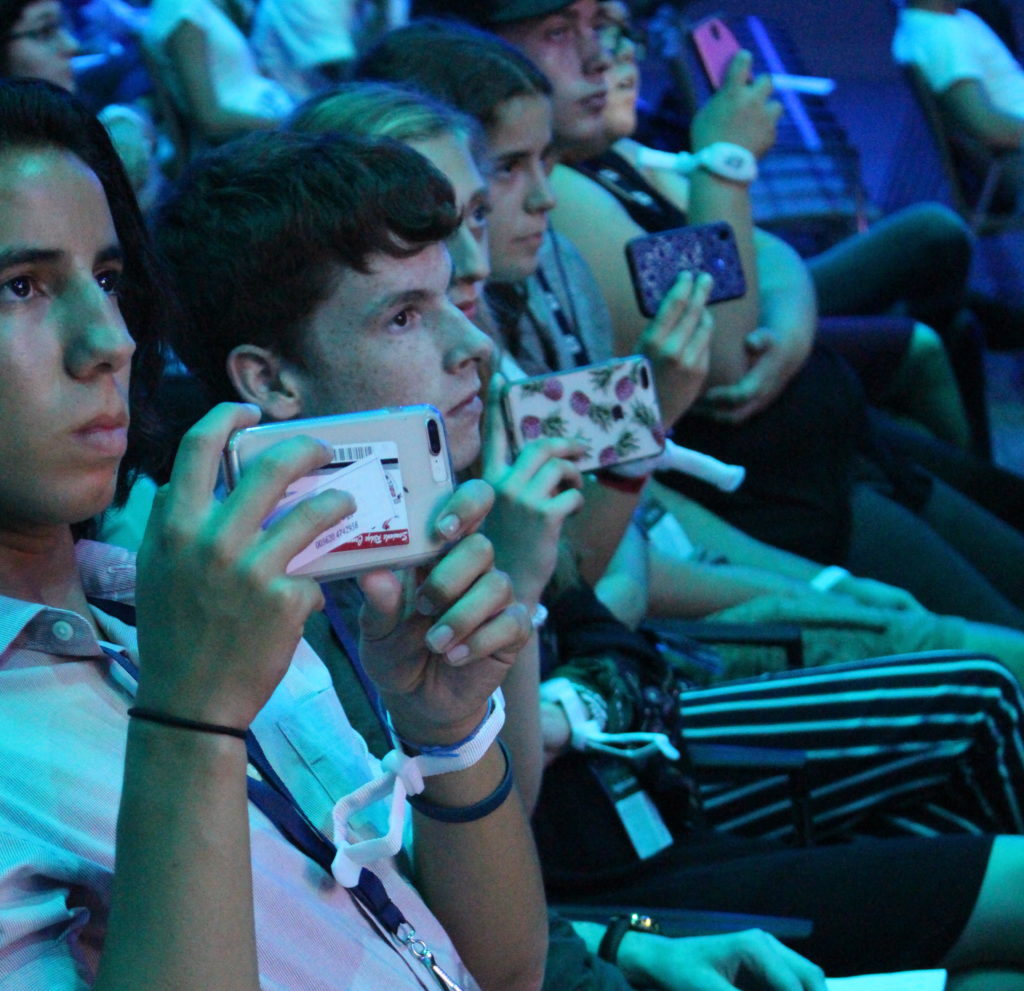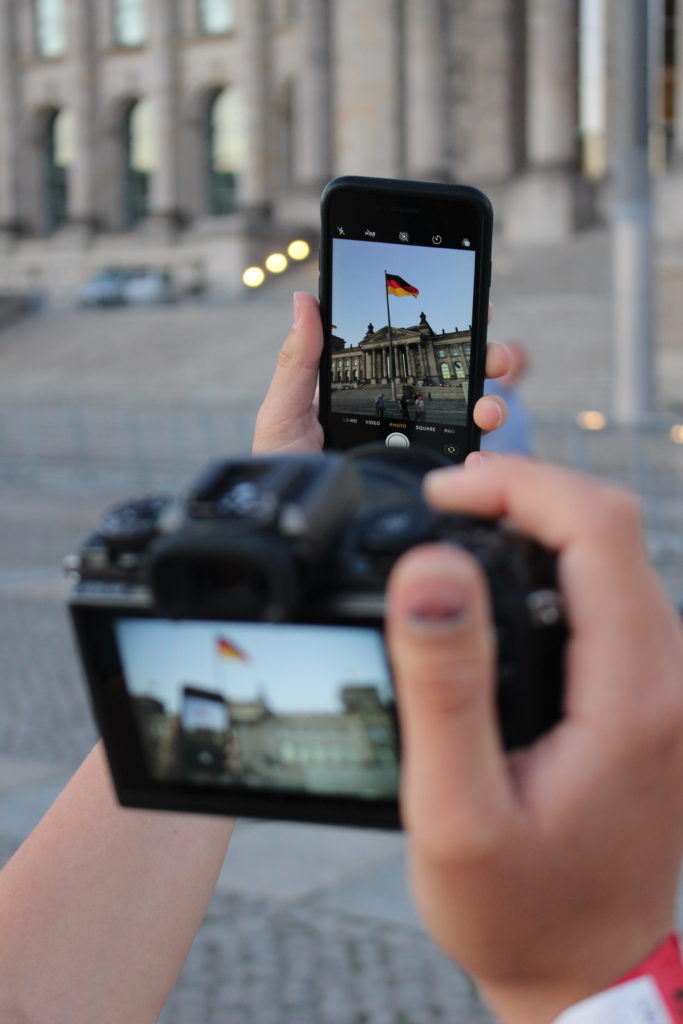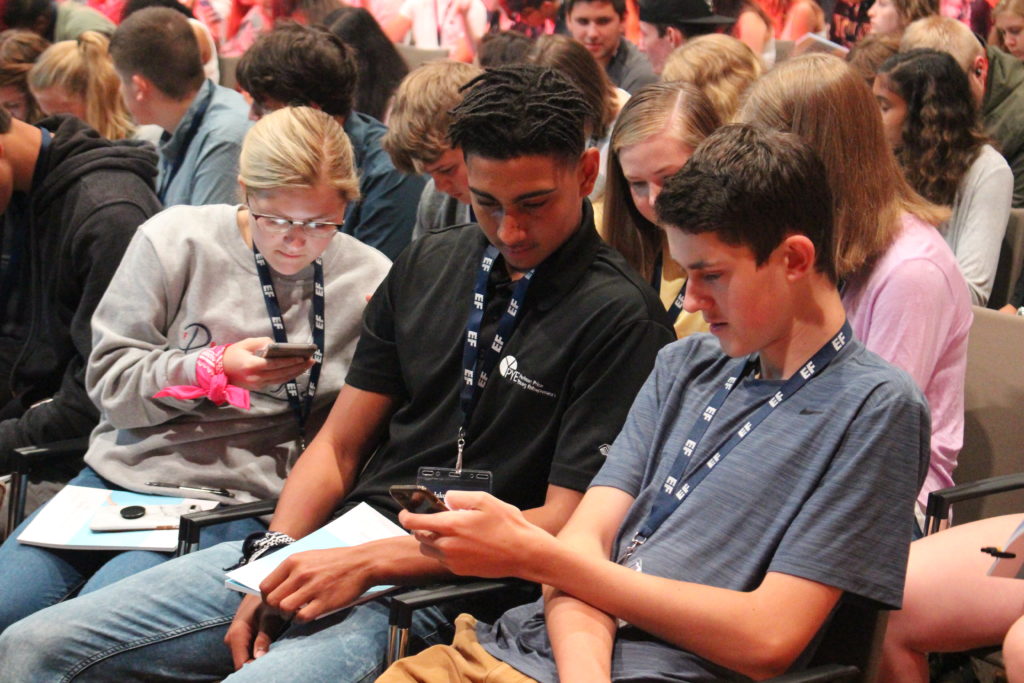
via EF Global Leadership Summit Photography Intern, Serena Olivieri
On a rainy Friday afternoon in Berlin, world-renowned illusionist Jason Latimer stands on a stage holding three glass cups and a small yellow ball. Unlike most magicians, Latimer is forthcoming about the trick he plans to perform next: cups and balls, a two-thousand-year-old sleight of hand that uses cups to mysteriously change the location of a few small balls. “I didn’t become a magician to trick people,” says Latimer. “I became a magician to inspire people to ask the right questions – to challenge the illusion of knowledge.”
But for this trick, the transparency is more than symbolic: the cups are clear.
The audience is skeptical. They know this trick cannot work. Never mind that Latimer is the 2003 Grand Prix World Champion of Magic; how can someone change the location of an object in plain sight? The illusionist senses his audience’s disbelief, smiles, and begins the trick. As Latimer moves the cups across the table, the audience is waiting to catch his mistakes – but seamlessly, inexplicably, the ball disappears from one clear cup and reappears in another. It happens again, and again, and again until there is no doubt left in the audience’s mind: this man is a wizard.
When the trick is finished, Latimer looks into the awestruck faces before him. “Any questions?” he asks, smiling.
This is the opening ceremony of the EF Global Leadership Summit, a weekend-long conference of innovation and inspiration that brings together over fifteen hundred students from across the globe. Beginning on July 13, in the heart of Berlin, the Summit is centered around one theme: The Influence of Technology on Society. For two days, students work in groups of ten to design innovations that use technology to address a variety of challenges in their daily lives, from broken pencils to food allergies to street harassment, all while attending keynotes and workshops led by experts and organizations from around the world.
The global cooperation that occurs at the Summit can be seen as a metaphor for media technology itself. Just like the internet, the Summit provides a place where all students – regardless of gender, national origin, or socioeconomic status – can share their experiences and perspectives to foster innovation. In this way, the internet and media technology support global democracy by giving everyone the ability to create change in their hometowns and beyond. “It’s amazing the impact you can have on the world without needing a large amount of money,” says Randi Zuckerberg, former Director of Market Development for Facebook and current CEO of Zuckerberg Media. “Anyone with WiFi connection in a cafe can build something and shape the world.”

via EF Global Leadership Summit Photography Intern, Serena Olivieri
One example of this is the It Gets Better Project, a partner organization at the Summit, which uses social media and storytelling to connect older LGBTQ people with the younger generation. Founded by Dan Savage and Terry Miller in Los Angeles, the It Gets Better Project began as a simple series of online videos back in 2010 when YouTube was mostly used for home videos and cat fails. “We were one of the first viral activism campaigns to happen on YouTube,” explains Justin Tindall, director of Education and Global Programming for the organization. Now, the It Gets Better Project has expanded to include an international affiliate network of volunteer teams in 20 countries, which continue the work that began in Los Angeles by using social media to tell stories to their local communities. Thanks to the growth of technology and spread of the Internet, says Tindall, they are able to “uplift and empower LGBTQ youth around the world.”
The It Gets Better Project is one of many examples of the democratizing power of technology: thanks to social media, the voices of previously isolated communities can become amplified. In this way, the human experience is no longer “the knowledge of a small group of people,” says Sibylle Trost, journalist and founder of Berlin’s Insights Media Tours. “Instead, everyone in the whole world can make a video and share opinions.”
Nevertheless, Trost is wary of technology’s widespread accessibility. “I couldn’t say that technology helps democratic societies. In Germany, the democracy is very harmed by misleading or selective information, and everybody on the street calls themselves a journalist.”
The complicated relationship between technology and democracy in the Age of Information has significant global implications, particularly through social media platforms. “At Facebook, we were so excited to watch our site being used in the uprisings of the Arab Spring – we thought, Yes! We gave a voice to everyone!” Randi Zuckerberg recalls, smiling and pumping her fist in the air. But the moment doesn’t last long – a few seconds later, her face drops into a grimace. “And then we realized, Oh no – we gave a voice to everyone…”
Today, there are many global examples of social media misleading the public and perpetuating confirmation bias, a phenomenon in which people only search for and accept facts that they agree with. And while most of the time it is seemingly harmless, in some places it has become more than suggestive: it has turned deadly. According to the National Public Radio, viral WhatsApp messages forwarded throughout India which warn people of “kidnappers” in their area have led mobs around the country to attack and kill about two dozen people, sparking a national crisis. And while WhatsApp – a messaging service owned by Facebook – has taken steps to combat the forwarding of such chain messages, the danger of unverified information persists.

via EF Global Leadership Summit Photography Intern, Serena Olivieri
The beauty and importance of a free internet is undeniable. Never before in the history of the world has information been so widely available or international collaboration so efficient. Combined with the advancement of technological devices, the possibilities for innovation are endless; the question is no longer what humanity can do, but what it cannot. However, as much as the expansion of internet-based technology has helped to democratize the world, the subsequent spread of misinformation poses an even larger threat. In the Age of Information – when access to a search engine is enough qualification to be considered an expert, and everyone’s opinion is validated by the internet – who decides the truth? When each of us has the resources to define the world according to ourselves, how can we ensure that we are not simply mindless consumers of online content?
While future generations of children, unfamiliar with the time before Google and Siri, may grow up believing that the internet itself is omnipotent, the fact remains: the source of all information is humanity. It is only once we become conscious curators and consumers of the collective human database that we call the internet – and, in the words of Jason Latimer, “challenge the illusion of knowledge” which confirmation bias so covertly constructs – that we can utilize the democratizing power of technology to answer “the right questions” and truly foster innovation.
Related articles
